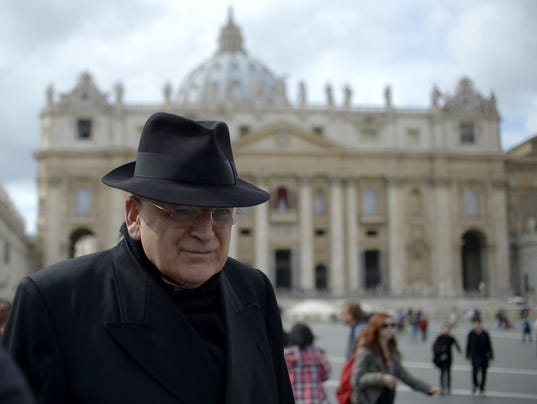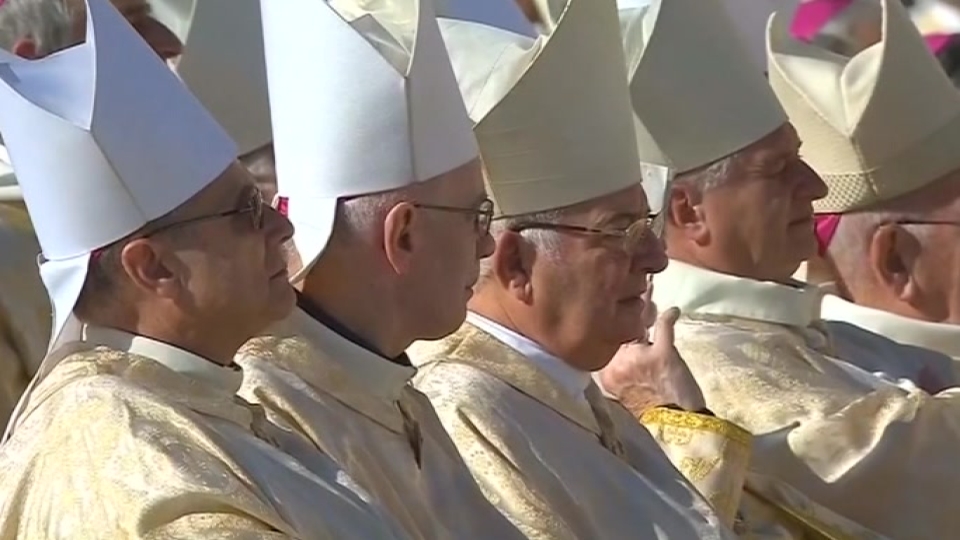
Conservative U.S. Cardinal Raymond Burke, shown in a 2013 photo crossing St. Peter's Square in Rome, was demoted for a second time by Pope Francis.
Cardinal Raymond Burke
Wikipedia
Excerpt: “'Is a tipping point drawing close when conservatives who have been inclined to give Pope Francis the benefit of the doubt will, instead, turn on him?'”
Vatican expert John Allen
Vatican expert John Allen
Pope Francis again demotes hardline U.S. Cardinal
In a move that reflects the loosening posture of the Vatican on major social issues, conservative U.S. cardinal Raymond Burke was removed by Pope Francis from yet another top post.
Burke, who has long been vocal about denying communion to Catholic politicians who support abortion, was dismissed as head of the Holy See's highest court and given the post of Patron of the Sovereign Military Order of Malta, a largely ceremonial job overseeing charity to the elderly.
At 66, Burke is considered young by church hierarchy standards. The dismissal is a set-back to his Vatican career as well as a clear message from Pope Francis to those not hewing to his progressive view of the Catholic Church.
The move was expected by Vatican watchers given that Burke, the former archbishop of St. Louis, had openly criticized Francis' less doctrinaire approach to the faith. Last year, Francis had removed Burke from the Congregation for Bishops, a group tasked with the appointment of new bishops worldwide.
In an interview with a Spanish Catholic weekly published last week, Burke said of the pope's leadership: "Many have expressed their concerns to me. … There is a strong sense that the church is like a ship without a rudder."
Burke isn't alone in his critique of the path the Argentine Jesuit Pope has chosen for his flock; there are more than 1 billion baptized Catholics worldwide, 78 million of whom are American.
Francis eschews elaborate papal vestments in favor of more humble garb. He has been known to celebrate holidays by washing the feet of the poor and prisoners. And, notably, he has encouraged no-cost marriage annulments for Catholics and welcomed homosexuals to the church.
Philadelphia archbishop Charles Chaput recently characterized Francis' reign as one of "confusion," adding that "confusion is of the devil."
"The conservatives had it all their way for about 30 years, and now the shoe might be on the other foot,'' says the Rev. Paul Sullins, a priest who teaches sociology at the Catholic University of America in Washington, D.C. "Now they feel on the outside a little bit, which is exactly how the progressives used to feel.''
That was during the papacies of John Paul II (1978-2005) and Benedict XVI (2005-13), doctrinal conservatives who brooked little discussion and less dissension when it came to church teaching on issues such as ordination of women and compulsory priestly celibacy.
The veteran Vatican watcher John Allen asked last month in The Boston Globe: "Is a tipping point drawing close when conservatives who have been inclined to give Pope Francis the benefit of the doubt will, instead, turn on him?"
Regardless of such questions and the mounting criticisms, it is unlikely Pope Francis will change course. When a month ago the pontiff beatified Pope Paul VI — renowned for his progressive church views which were codified during the Second Vatican Council in the 1960s — Francis said plainly: "God is not afraid of new things."
Contributing: Rick Hampson, Associated Press

No comments:
Post a Comment